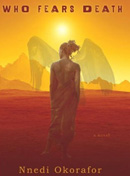

Daw Books, hardcover, 9780756406172
Nnedi Okarafor's fanciful and furious novel Who Fears Death is a truly strange hybrid, combining "ripped from the headlines" details of genocide, rape, and female genital mutilation with lyrical descriptions of African deserts and fantastical elements like dueling sorcerers and shape-shifting. It shouldn't work—but it does, and I was drawn in, even as I struggled to figure out where I was and where I was going with this book.
The novel is set in an alternate reality Africa that evokes Eden after the Fall; this world is divided between two peoples, the Okeke and the Nuru. Legends contained in a book sacred to both claim that the goddess Ani brought the lighter-skinned Nuru people down from the stars to enslave the dark-skinned Okeke people—the first people—as punishment for developing technology, poisoning the land, and violating the distance between gods and men. The Okeke have always been subservient to the Nuru, but now, with echoes of current-day Rwanda or Sudan, the Nuru have begun exterminating the Okeke, driving them further and further east from the Kingdom of the Seven Rivers. And, again with echoes of contemporary genocide, the Nuru employ rape as a weapon against the Okeke. Our novel's heroine—Onyesonwu—is an Ewu, the result of such an act. Perhaps because of her origins, Onye is only partially of the physical world, and discovers she has access to dangerous magical powers which make the people of her village fear her even more.
Onye's story is told, somewhat disjointedly, from the perspective of a seemingly much older and wiser woman looking back on her origins and the decisions she has made that have led to an apparently awful outcome. After a photographer from the West, where the Nuru are still fighting the Okeke, comes to Onye's village and reveals the truth of what's happening to the Okeke people, Onye and a small group of her most trusted friends set off on a journey there, where they hope to use Onye's powers to fulfill a prophecy that will remake the world and end the violence between the Nuru and the Okeke. The "journey to the West" portion of the book is somewhat tedious, to be honest, filled mostly with squabbling between the party members punctuated with interludes of danger and mystical encounters that didn't really help me understand where the story was going. I found myself getting increasingly impatient to know what was going to happen, and what had happened when Onye—reflecting on her past to an unknown confidant—claimed that she had "caused it all." Ewu are supposedly marked by a propensity toward violence, and Onye's Ewu nature, combined with her incredible powers of destruction, lead her to commit some acts of stunning cruelty along the journey.
This book pays off in the end, and it's clear that the author is deeply pained by contemporary social ills
in Africa. The obvious emotion that went into this book, combined with the crazy creativity, makes me more
forgiving of the narrative lag in the middle of the book than I might otherwise be. I didn't always know
where I was going with this book, but I was glad when I got there that I had stayed with the journey.
